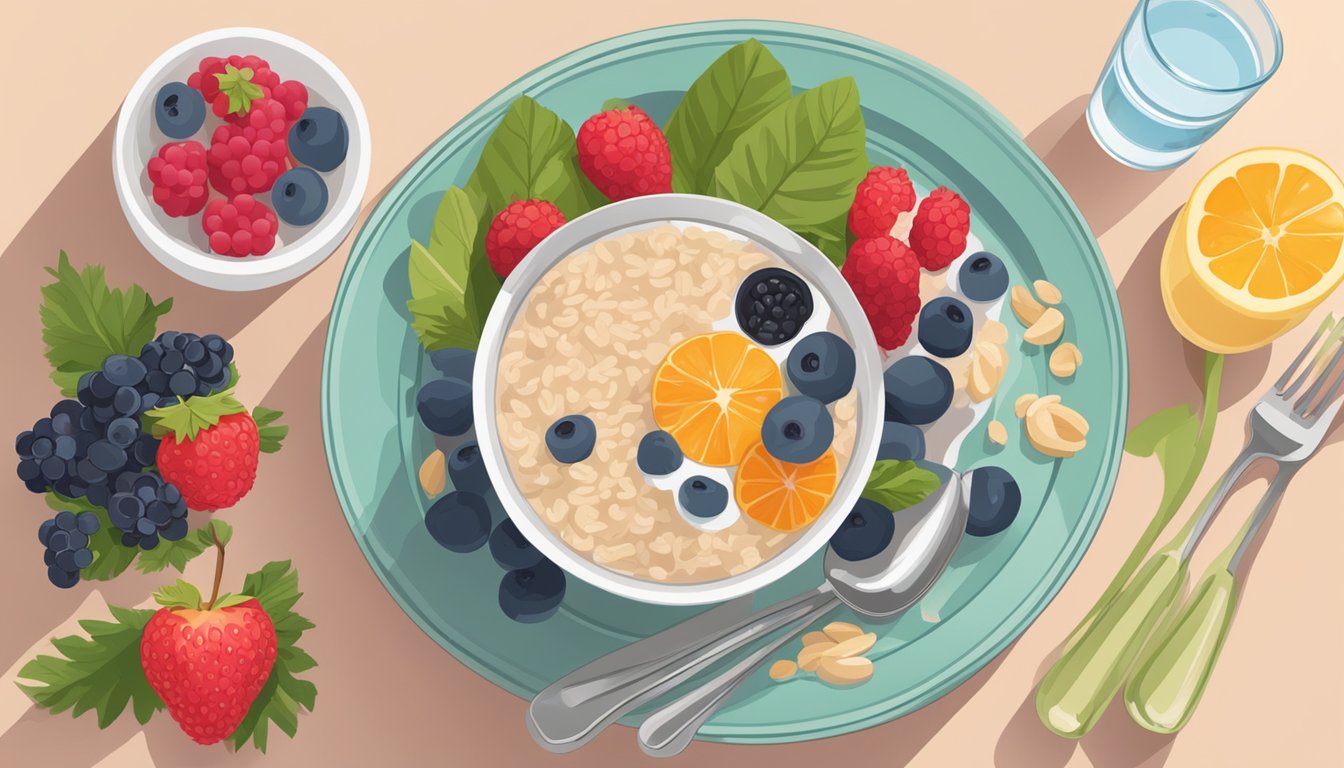A kidney-friendly breakfast sets the tone for a healthy day, especially for those managing chronic kidney disease. Choosing the right foods can support kidney function while providing essential nutrients to start the morning. Ideal breakfast options for kidney health include fresh fruits, egg whites, oatmeal, and low-sodium whole grain toast.
Breakfast plays a crucial role in stabilizing blood sugar levels and providing sustained energy throughout the day. For individuals with kidney concerns, it’s important to focus on foods that are low in sodium, phosphorus, and potassium. This means limiting processed foods and opting for whole, natural ingredients whenever possible.
Creativity in the kitchen can make kidney-friendly breakfasts both delicious and nutritious. From vegetable-packed omelets to fruit smoothies made with kidney-friendly ingredients, there are numerous ways to enjoy a tasty morning meal while supporting renal health. By incorporating a variety of kidney-friendly foods, individuals can ensure they’re getting a balance of nutrients without compromising their renal diet.
Understanding Kidney Health and Diet
A kidney-friendly diet plays a crucial role in managing kidney disease and maintaining overall kidney health. Proper nutrition helps control blood pressure, manage nutrient levels, and slow the progression of kidney damage.
Role of Diet in Kidney Disease Management
Dietary choices significantly impact kidney function in individuals with chronic kidney disease (CKD). A well-planned renal diet helps reduce the workload on the kidneys and prevents further damage. It focuses on controlling intake of certain nutrients that can build up in the blood when kidneys are not functioning optimally.
Key dietary strategies include:
- Limiting sodium to manage blood pressure
- Controlling potassium and phosphorus levels
- Balancing protein intake
- Increasing fiber consumption
These adjustments help minimize complications and slow disease progression. Working with a dietitian ensures a personalized approach tailored to individual needs and kidney function levels.
Nutrients to Monitor for Kidney Health
Specific nutrients require careful attention in a kidney-friendly diet:
Sodium: Excess sodium can raise blood pressure and increase fluid retention. Aim for less than 2,300 mg daily.
Potassium: High levels can strain the heart. Limit intake based on individual needs.
Phosphorus: Elevated levels can weaken bones. Choose low-phosphorus foods and avoid additives.
Protein: Needs vary based on kidney function. Too much can overtax kidneys, while too little leads to muscle loss.
Fiber: Aids digestion and helps control blood sugar. Aim for 25-30 grams daily.
Calcium: Important for bone health, but needs careful balancing with phosphorus intake.
Regular monitoring of blood levels helps guide dietary adjustments. A kidney-friendly breakfast should incorporate these principles to support overall kidney health.
Healthy Breakfast Options for Kidney Care
A kidney-friendly breakfast provides essential nutrients while minimizing strain on the kidneys. Choosing whole foods, controlling sodium intake, and balancing protein are key aspects of a renal diet.
Kidney-Friendly Whole Foods
Whole foods are excellent choices for kidney health. Oatmeal is a nutritious option, providing fiber and essential nutrients. Prepare it with water or low-fat milk alternatives to control phosphorus intake. Fresh fruits like berries, apples, and pears are kidney-friendly and add natural sweetness to meals.
Whole grain toast with avocado offers healthy fats and fiber. Vegetables such as bell peppers, onions, and spinach can be incorporated into egg dishes or tofu scrambles. These options provide vitamins and minerals while being gentle on the kidneys.
Low Sodium Breakfast Choices
Reducing sodium intake is crucial for kidney health. Opt for homemade meals to control salt content. Instead of pre-packaged cereals, choose plain rolled oats and add flavor with cinnamon or fresh fruit.
Egg white omelets with fresh vegetables are a tasty low-sodium option. Use herbs and spices for seasoning instead of salt. Greek yogurt with fresh berries provides protein and calcium without added sodium.
Home-cooked breakfast options allow for better control over sodium content compared to processed foods or restaurant meals.
Protein Selection for Kidney Diets
Protein needs vary depending on kidney disease stage. For early stages, focus on moderate protein intake. Egg whites are an excellent low-phosphorus protein source. Tofu scrambles offer a plant-based alternative rich in nutrients.
Greek yogurt provides protein and probiotics. Choose unsweetened varieties to control sugar intake. For those requiring higher protein, lean meats like turkey bacon or chicken sausage can be included in moderation.
Consult a renal dietitian to determine appropriate protein amounts based on individual needs and kidney function.
Avoiding Harmful Foods

Certain breakfast foods can negatively impact kidney health. Limiting specific ingredients and food types helps protect kidney function and manage symptoms for those with chronic kidney disease.
Limiting Processed Foods and Meats
Processed foods and meats often contain high levels of sodium, phosphorus, and potassium. These nutrients can strain the kidneys and worsen kidney disease symptoms. Breakfast meats like bacon and sausage are particularly problematic. They’re high in sodium and phosphorus, which kidneys struggle to filter out.
Opt for fresh, whole foods instead. Choose lean proteins like egg whites or tofu scrambles. Replace processed meats with plant-based alternatives or small portions of fresh fish.
Be wary of packaged breakfast items. Many cereals, granola bars, and instant oatmeals have added phosphorus and sodium. Read labels carefully and select low-sodium, minimally processed options when possible.
Sugars and Sweeteners in Breakfast Items
Added sugars in breakfast foods can lead to blood sugar spikes and increased inflammation. This puts extra stress on the kidneys. Many breakfast cereals, flavored yogurts, and baked goods contain high amounts of added sugar.
Check nutrition labels for hidden sugars. Look out for terms like corn syrup, dextrose, and maltose. Choose unsweetened versions of breakfast staples when available.
Natural sweeteners like honey and maple syrup still impact blood sugar. Use them sparingly. Opt for fresh fruits to add sweetness to breakfast dishes. Berries, apples, and pears are lower in potassium and provide fiber and antioxidants.
Dairy and Calcium Conscious Eating
Dairy products can be challenging for those with kidney disease. They’re high in phosphorus, which damaged kidneys struggle to remove from the blood. However, calcium is essential for bone health.
Consider low-phosphorus dairy alternatives:
- Almond milk (unsweetened)
- Rice milk
- Coconut milk yogurt
If including dairy, choose lower phosphorus options:
- Cream cheese
- Cottage cheese
- Hard cheeses in small amounts
Work with a dietitian to ensure adequate calcium intake. Non-dairy sources like fortified juices, leafy greens, and certain types of tofu can help meet calcium needs without overloading on phosphorus.
Milk Alternatives and Beverages
For those with kidney disease, choosing the right milk alternatives and beverages is crucial. Plant-based options and specific morning drinks can support kidney health while providing essential nutrients.
Plant-Based Milk Substitutes
Almond milk stands out as a kidney-friendly choice. It’s low in potassium and phosphorus, making it suitable for those on renal diets. Rice milk is another excellent option, naturally low in phosphorus and potassium.
Unsweetened versions of these milk alternatives are best to avoid added sugars. Some brands fortify their products with calcium and vitamin D, which can be beneficial for bone health.
Coconut milk yogurt offers a creamy texture without excessive potassium. It’s a good alternative to dairy yogurt for breakfast or snacks.
Coffee and Other Morning Beverages
Coffee consumption should be limited for those with kidney disease. One cup a day, including decaf, is generally acceptable. Filter coffee is slightly better than instant varieties.
Tea is a kidney-friendly alternative to coffee. It provides antioxidants without the high levels of potassium or phosphorus found in some other beverages.
Chicory extract can serve as a coffee substitute, though its taste may not be for everyone. Water remains the best choice for hydration and kidney health.
When selecting beverages, always check labels for added phosphates or high potassium content. Moderation is key, even with kidney-friendly options.
Sample Kidney-Friendly Breakfast Menus
A kidney-friendly breakfast can provide essential nutrients while limiting sodium, potassium, and phosphorus. Here are some sample menus to inspire healthy morning meals:
Menu 1:
- Whole grain toast with unsalted almond butter
- Sliced apple
- Herbal tea
Menu 2:
- Oatmeal topped with blueberries and a sprinkle of cinnamon
- Scrambled egg whites
- Coffee with non-dairy creamer
Menu 3:
- Greek yogurt parfait with low-potassium berries and granola
- Slice of melon
- Green tea
These menus incorporate kidney-friendly ingredients while offering variety. Whole grains provide fiber, while fruits add natural sweetness and vitamins. Protein sources like egg whites and Greek yogurt support muscle health.
For those seeking savory options:
Menu 4:
- Tofu scramble with bell peppers and onions
- Whole wheat English muffin
- Fresh pear slices
Menu 5:
- Breakfast burrito with egg whites, low-sodium black beans, and salsa
- Small orange
- Decaf coffee
Portion control is key in kidney-friendly diets. Patients should consult their dietitian for personalized advice on serving sizes and specific food choices tailored to their needs.
Lifestyle Considerations and Breakfast Routine
Adopting a kidney-friendly breakfast routine involves mindful food choices and expert guidance. Incorporating low potassium options and consulting with a renal dietitian can help create a sustainable and nourishing morning meal plan.
Incorporating Low Potassium Foods
A low potassium diet is crucial for many with kidney disease. Breakfast can include fruits like apples, pears, or blueberries. Whole grain cereals or toast with egg whites provide protein without excess potassium. Milk alternatives such as rice milk or unenriched almond milk are suitable options.
Oatmeal prepared with water instead of milk can be a filling choice. Add cinnamon or berries for flavor. Smoothies made with low potassium fruits and vegetables offer variety. Avoid high potassium foods like bananas, oranges, and tomatoes.
Portion control is key. Even low potassium foods can add up if consumed in large quantities. Use measuring tools to ensure appropriate serving sizes.
Consulting with a Renal Dietitian
A kidney dietitian provides personalized advice based on individual health needs. They can help create meal plans that balance nutrients while considering medication interactions and lab results.
Regular consultations allow for adjustments as kidney function changes. Dietitians can suggest suitable supplements if needed. They also offer tips for dining out and managing special occasions.
Bringing food diaries to appointments helps dietitians assess current intake. They can identify areas for improvement and suggest alternatives to favorite high potassium foods.
Working with a renal dietitian ensures a breakfast routine that supports kidney health while maintaining quality of life. Their expertise helps navigate complex nutritional requirements safely.
Economic and Accessibility Considerations
Preparing kidney-friendly breakfasts can be cost-effective and accessible for most individuals. Many nutritious ingredients are relatively inexpensive and widely available.
Eggs, oatmeal, and certain fruits are budget-friendly options that support kidney health. These staples can be found in most grocery stores and markets.
For those on a tight budget, buying in bulk or choosing frozen fruits and vegetables can help reduce costs. These options retain their nutritional value while offering longer shelf life.
Some kidney-friendly breakfast ingredients may be more expensive, such as certain plant-based milk alternatives or specialized low-sodium products. However, these are not essential for a healthy renal diet.
Food assistance programs and local food banks often provide kidney-friendly options. These resources can help individuals with limited income access nutritious breakfast ingredients.
Meal planning and preparation can significantly reduce costs and improve accessibility. Batch cooking breakfast items like egg muffins or overnight oats saves time and money.
Cost-saving tips:
- Buy seasonal produce
- Look for sales and discounts
- Use coupons when available
- Compare prices between stores
By focusing on simple, whole foods and utilizing smart shopping strategies, individuals can create affordable and accessible kidney-friendly breakfasts.
Seeking Medical Advice and Diagnosis

Consulting a healthcare professional is crucial for individuals concerned about their kidney health. A nephrologist specializes in kidney care and can provide personalized guidance on dietary choices.
Regular check-ups allow for early detection of kidney issues. Blood and urine tests help assess kidney function and identify potential problems before they become severe.
Medical professionals can tailor dietary recommendations based on an individual’s specific kidney condition. They consider factors such as:
- Stage of kidney disease
- Presence of other health conditions
- Current medications
- Overall nutritional status
A doctor or registered dietitian can create a meal plan that balances nutritional needs with kidney health. This personalized approach ensures optimal nutrition while managing kidney function.
Seeking medical advice also provides access to the latest research and treatment options. Healthcare providers stay updated on advancements in kidney care and can offer evidence-based recommendations.
Remember, self-diagnosis and self-treatment can be risky. Only a qualified medical professional can accurately assess kidney health and provide appropriate guidance for dietary choices, including breakfast options.




